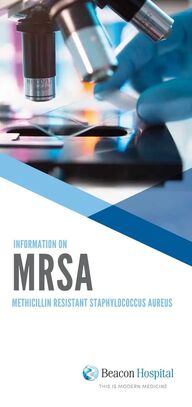
Return to flip book view
What Happens When I Go Home MRSA is a low risk for people who are generally well and not in hospital When you leave hospital you can have a normal family and social life You are not a big risk to other people The MRSA may go away over time especially if you do not need to take antibiotics for any reason Usually it is not necessary to try to clear the MRSA with lotions and creams after you have gone home Some people will want to try to clear the MRSA because they do not feel comfortable knowing that they have MRSA There is a small number of people who carry MRSA who seem to be very vulnerable to it and keep getting infections For those people it is sometimes necessary to follow a course of treatment with lotions and creams to clear up the MRSA If you have MRSA and you have to visit your doctor or if you are re admitted to hospital you should let them know that you had MRSA in the past This will ensure you get the correct treatment If your child has MRSA they can attend nursery and go to school as normal In everyday life you do not have to tell people that you carry MRSA INFORMATION ON MRSA Further information Please do not hesitate to ask the healthcare staff caring for you if you have any questions or if you require more information about MRSA Information on hand hygiene infection control and managing superbugs at home is available on www hse ie infectioncontrol METHICILLIN RESISTANT STAPHYLOCOCCUS AUREUS INFECTION PREVENTION CONTROL TEAM Beacon Hospital Sandyford Dublin 18 D18 AK68 This leaflet is adapted from the information leaflet produced by the HSE www hse ie August 2022 Version 2 Tel 01 293 6600 www beaconhospital ie
INFORMATION ON MRSA METHICILLIN RESISTANT STAPHYLOCOCCUS AUREUS What Is MRSA MRSA stands for methicillin resistant Staphylococcus aureus Staphylococcus aureus pronounced staf ill okokus or ee us or Staph aureus for short It is a common germ that lives completely harmlessly on the skin or in the nose of about one in three people MRSA is a type of Staph aureus that has become resistant to a number of different antibiotics Most people who carry MRSA on their bodies or in their noses don t suffer any ill effects Carrying the germ harmlessly like this is called colonisation However MRSA sometimes causes infections if it enters the body This is more likely to happen to people who are already unwell particularly those who are in hospital with a serious illness When MRSA causes infection it can be treated with special antibiotics as some common antibiotics will not work Doctors need to know as soon as possible so that you get the right antibiotics How Could I Get MRSA Staph including MRSA falls off the skin and nose of people who carry it This happens all the time so that staph is often found on surfaces towels sinks on hands and in food People pick up staph all the time in everyday contact with other people and things that people use The bug spreads to new people when they touch something with staph on it Twenty to thirty years ago MRSA was almost always a hospital superbug and was very rare in people who were never in hospital This has changed although people who spend a lot of time in hospital or in nursing homes still have a greater chance of carrying MRSA MRSA is now so common that even people who have no contact with hospitals or nursing homes sometimes carry MRSA In some countries there are types of MRSA that spread mostly in the community for example in sports clubs How Do I Know If I Have MRSA You will only know if you have MRSA if it is found in a lab test Many people coming into hospital have a swab taken from their nose or their skin to check if they are carrying MRSA This is a simple procedure where the swab which is like a cotton bud is rubbed up your nose or on your skin to take a sample What Happens If I Have MRSA in Hospital Hospitals try to stop MRSA spreading because many people in hospital are already very sick and vulnerable If very vulnerable people get an MRSA infection it can be hard to treat because the usual antibiotics do not work very well Doctors have to use special antibiotics If you have MRSA you may be cared for in a single room Hospital staff looking after you will be very careful to clean their hands after they care for you They may wear aprons and gloves when doing certain tasks Sometimes you will be prescribed medication such as washing lotions creams ointment or powder to help get rid of the MRSA These steps are taken to protect you and other patients who may be seriously ill and unable to cope with another infection How Can I Help to Stop the Spread of MRSA Cleaning your hands thoroughly is the best way to help stop the spread of almost any bug including MRSA Hands should be cleaned before and after changing any dressing on a wound or handling any drips or tubes that enter the body If you have MRSA you can help the hospital staff by reminding them to clean their hands after they care for you If you know you have MRSA it is best to have very little contact with other patients when you are in hospital and it is best not to share newspapers or other things with other patients A single room for people with MRSA makes it easier to limit contact with other patients